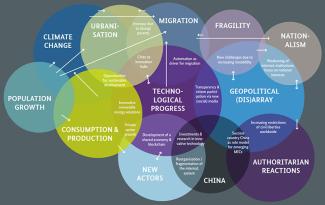Global trends
The future of development and development policy

The Delphi method involves a consultation process and is used, amongst other things, to assess future trends. A total of 31 experts were consulted in the present study, including our interview partner Imme Scholz of the German Development Institute (Deutsches Institut für Entwicklungspolitik – DIE) (see main text).
Taking into account the findings of the first Delphi study in 2016 and the current state of research, the BMZ identified 30 trends, grouped into six thematic clusters. Experts from think tanks, bi- and multilateral organisations and the private sector in the global north and south were then asked whether they agreed with the trends and whether they thought development policy could positively influence them.
The experts reconfirmed findings of the 2016 Delphi process such as the major transformative impact of new technologies and the negative impacts of environmental degradation and non-sustainable lifestyles. The participants also stressed that increasing fragility and inequality will remain major challenges in 2032 but that other trends such as growing urbanisation might offer positive development opportunities. New factors identified include the increase in nationalist tendencies, the growing role of China and the increasingly pervasive nature of digitalisation and automation.
The experts broadly agreed with the trends presented by the BMZ. Agreement was greatest on the trend that fragile and conflict-ridden states will present major obstacles to sustainable development. In second place was the perception that changes in the labour market wrought by automation will create the need for new skills and regeared education systems. Almost as many experts agreed that climate change and environmental degradation will have increasingly adverse consequences for humankind’s overall quality of life.
Less clear, however, are the conclusions drawn from the trends for development policy. While the experts see considerable scope for positive influence on medical progress, climate change and poverty, for example, there is widespread scepticism in other areas. Around a third of those interviewed believe there is no way that development policy can impact positively in the context of China’s growing influence; another third believe its potential is limited. Opinion is similarly divided on the issues of global energy transition and automation of work.
In the wake of the Delphi process, the BMZ sees a need for action on four levels:
- change of paradigm,
- increased analysis and research,
- adaptation of development measures and
- establishment of new partnerships and collaborations.
What form that action will take remains to be seen.
Katja Dombrowski
Link
BMZ Delphi study, 2018: Development policy in 2032. Global trends and hypotheses on future development cooperation.
https://www.bmz.de/en/publications/type_of_publication/strategies/Strategiepapier445_02_2018.pdf










